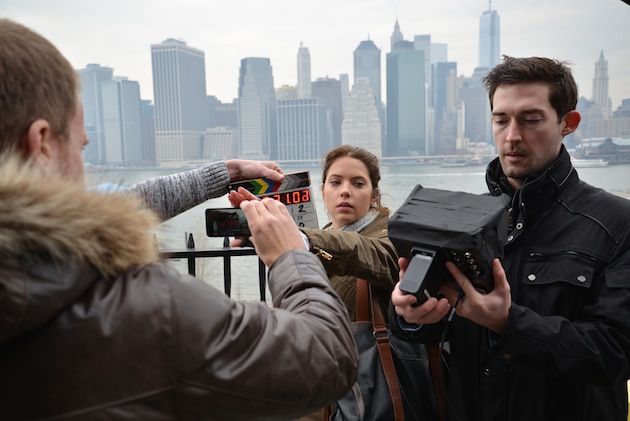Now, surely discovery plays heavily into any fest the world over, whether that's finding a film like no other, or your next new favorite filmmaker. But the reason why Slamdance gets extra points in my book is their programming process. All their programming is culled from completely blind submissions. Slamdance is one of the few festivals in North America to do this. So you know that when the films are complete surprises for the programmers (all past Slamdance filmmakers themselves) that their selection must be extra special.
To top this their entire narrative and documentary competition lineups are from first-time feature directors. Remember what I said about finding your next new favorite filmmaker? Past participants in Slamdance have included early works from Christopher Nolan, The Russo Brothers, Behn Zeitlen and Lena Dunham.
So today I welcome you to discover a handful of fresh filmmakers from this year's Slamdance competition slate who were nice enough to fill out a little Q&A I concocted. Make sure to come back next Monday for part 2 with even more fresh faces in the indie scene.
The 21st Slamdance FIlm Festival takes place in Park City, Utah at Treasure Mountain Inn, January 23 - 29.




Branden Kramer, director of RATTER - Narrative
Emma is being watched by a stalker who has hacked into all of her personal technology – laptop, cell phone, and other web connected devices – to record her most intimate moments. Eventually the video feeds aren’t enough and the stalker moves from the virtual to the physical.
Tell us about your film, but not in a plot-centric way, please…
One of the main themes in the film is privacy. The devices we use - cell phones, tablets, laptops - store our whole lives. We use them constantly, and yet we barely think about how safe they are. We know about hacking - there’s a major corporate hack almost every month - but do people think about what it could mean on a personal level? Imagine a hidden camera inside your home, which strangers around the world can tap into, without you knowing. We found countless stories like this researching for the film. Groups of hackers trading webcam video feeds in underground “Ratting” communities. It was very unsettling and we knew we needed to wrap a bold narrative around it.
Share with us a pivotal cinema related experience or moment from your childhood/adolescence
I was a little older but I distinctly remember the feeling I had after seeing The Matrix in the theater. It hit me on a philosophical level. The film was a powerful reminder of how this medium can engage us with complex questions. It can ripple out into culture and spark debate. The Matrix made me think for weeks and I was inspired by the existential ambition of it all.
Why Slamdance?
We’re lucky to be part of The Slamdance Film Festival. It’s relatively small but incredibly selective and they really focus on bold indie films. I think they have a very brave, unapologetic attitude about what they showcase. Slamdance is the perfect fit for Ratter.
What does the notion of a sustainable film industry mean to you?
Original stories. And paying new writers fairly for them. I think it’s great what organizations like The Black List have been doing - elevating writers in an industry that’s very hard to navigate.
Your essential Park City survival kit:
My team.
Steve Yu, director of THE RESURRECTION OF JAKE THE SNAKE - Documentary
Legendary wrestler Jake "The Snake" Roberts charts his personal and professional comeback while battling crippling addictions.
Tell us about your film, but not in a plot-centric way, please…
It’s always a nerve wracking part of the creative process to say anything is ready for the general public, but we are incredibly excited that this story was able to be told -- it’s an incredible story whether you are a fan of Professional Wrestling or not. It’s pretty amazing that we had such access to three of wrestling’s biggest stars, in a very raw, and emotional way. At times during production I remember thinking to myself, “I can’t believe we just captured that moment on film!” I remember pitching the idea to Dallas Page initially and him thinking I was nuts… since I clearly didn’t have any idea what type of journey I was suggesting. Being a part of helping Jake overcome some of his demons and addictions, and to have his story inspire other people...to me, that’s what this project was always about.
Share with us a pivotal cinema related experience or moment from your childhood/adolescence
I always loved films that had a inspirational element to them as a kid. I would watch comeback scenes over and over again prior to any sporting events. I would listen to movie soundtracks from the most inspiring scenes to relive them. Later I would pay closer attention to moments within films that created a wave of emotion that I could feel physically… something different from joy or excitement, because it makes you want to go out and do something BIG.
Why Slamdance?
I’ve always loved underdog stories, anytime an ordinary person can achieve something amazing. Slamdance fits our team of filmmakers and our cast of professional wrestlers perfectly. No pretense, fueled by the passion for what we do. I’ve been to Park City in late January before, and it’s one of the most inspiring environments to be as a filmmaker. It’s still hard to believe our film was selected to be part of Slamdance, and hard to accept that we belong there with the other filmmakers, but I couldn’t think of a better place for this amazing story to be told. I can’t wait for my entire production team to experience this kind of energy and inspiration.
What does the notion of a sustainable film industry mean to you?
The notion of a “sustainable film industry” to me relates to how the film industry is going to adapt to the very dramatically changing landscape of business. I believe that consumers will always be hungry for great films no matter what the delivery mechanism is, I think the industry needs to be innovative enough to create a business model that works with all the new technologies. There’s no clear answer for this, as I think barriers to entry into filmmaking are coming down with cheaper filmmaking tools, marketing methods, and distribution options -- it’s more a matter of how adaptable the bigger players in the film industry can be to remain as successful as they have been in the past. I think for independent filmmakers, there are incredible new ways to not only fund films, but creative ways to distribute and market them with much lower budgets. For me, it’s a pretty exciting time!
Your essential Park City survival kit:
Ear muffs, Protein bars, Panasonic GH4.
Michael Steves, director of CLINGER - Narrative
When her possessive high school boyfriend dies in a gruesome accident, Fern Petersen's life is thrown into turmoil. Things go from bad to worse when he returns as a love-sick ghost to kill her so they can be together for eternity.
Tell us about your film, but not in a plot-centric way, please…
The last time I directed a project, I was stabbed in the chest in a gruesome theater accident. I was directing a stunt that involved a plastic sword, and our stage manager confused this prop with a very real steel sword. The puncture landed me in the ER.
While being stitched up in the hospital, I kept thinking about what was supposed to happen. The rehearsal was supposed to run smoothly. The play was supposed to open that night. And I wasn’t supposed to be in the hospital wearing a blood soaked shirt.
I came up with the premise for Clinger while being stitched up.
No matter how much you plan for the future, you never know when you’ll end up covered in blood, wondering how everything went so horribly wrong. At the heart of things, that is what Clinger is about.
Share with us a pivotal cinema related experience or moment from your childhood/adolescence
Superbad came out the same weekend that I lost my virginity. I remember going to see the movie with a friend of mine who had just lost his virginity as well, and we were floored by how closely the movie mirrored our own lives. Like Michael Cera and Jonah Hill in that film, I had also just managed to convince a girl who was totally out of my league to have sex with me.
One year later, that girl who was totally out of my league dumped me. I couldn't accept what had happened - I loved her (at least I thought I did), and I was a nice, kinda nerdy guy, so that means I have to get the girl at the end... right?
Turns out I was very wrong. Movies - and for many guys, high school coming-of-age movies - teach us that if we love someone, they will - they must - love us back. And if they don't love us back, then we'll still end up getting with the secretly beautiful best friend who wears glasses.
Robert Klingher (Vincent Martella), the villain in Clinger, is a teenager who is absolutely convinced that because he's a nice guy, he will end up with the beautiful girl. He'll be persistent, he'll never give up on true love, and in the end, his love will prevail and win her over. Robert, like me and many men at age 17, can't grasp the fact that they might be the possessive villain in the story - not the love-lorn hero. Robert is a fairly extreme version of this, as he resorts to murder to make sure the girl he loves won't become the one who got away.
When my first relationship didn't go at all as planned, I had to come to terms with the fact that movies like Superbad taught me one thing - that I deserved the love of the girl I decided to love. Real life taught me something completely different - that no one "deserves" to be loved back by the person they fall for, and thinking that someone owes you their love makes you a villain - not the nice guy hero.
Why Slamdance?
It's a festival that embraces movies that are out-of-the-ordinary, demented, strange, and fun. Clinger is a horror film in the tradition of practical FX-filled romps like Evil Dead 2, Dead/Alive, and Re-animator - it's a fun, gory horror movie that has heart and sincerity intertwined with the scares.
Slamdance focuses on films from first time filmmakers of a $1 million budget or less, and we were floored when we found out that our little movie we had just made after graduating college was accepted. Clinger was made by a cast and crew that included almost exclusively high school and college students and friends who had graduated college one month before production. Slamdance embraces that kind of indie spirit.
What does the notion of a sustainable film industry mean to you?
I don’t think anyone could claim that indie feature filmmaking is a “sustainable industry.” The vast majority of indie films don’t get seen by the public, much less make money. They are financed by people who want to do something cool and meaningful with their money. The thing we keep hearing from our investors on Clinger is “This has been fun!” Obviously the goal is to make money with the film, but if that is your only goal, you are very much in the wrong place.
Your essential Park City survival kit
We are bringing about 500 bright red condoms with us. We’re giving them away at Slamdance, referencing the scene where the lead character has sex with her ghost boyfriend (using a condom!) and his head pops off. The package says “Have safe sex with your ghost ex.” Aside from condoms, a huge coat and a knit cap.
Colin Offland, director of DENNIS RODMAN'S BIG BANG IN PYONGYANG - Documentary
An intimate behind the scenes look at Dennis Rodman's unlikely friendship with North Korean dictator Kim Jong-un and the staging of the most controversial game of basketball the world has never seen.
Tell us about your film, but not in a plot-centric way, please...
It’s Dennis’s story really. The whole of America knew about his trips to North Korea, but this is the first chance to get to see what he really got up to over there, warts and all. America’s relationship with North Korea, especially after the whole cyber-hacking thing, is pretty tetchy and stand-offish. Dennis believes that things can only improve by opening up lines of communication and interacting face to face, hence the basketball trip. He’s an interesting subject - although he struggles to control his behaviour (and boozing) and there’s no doubt he’s naive to a great deal of stuff that goes on over there, the film hopefully shows that his heart is in the right place. And, believe it or not, his approach to international diplomacy might just work.
Share with us a pivotal cinema-related experience or moment from your childhood/adolescence.
Late 70s. Grease. Eating popcorn and looking around the cinema as grown-ups danced in the aisle.
Why Slamdance?
From everything I read about the festival, I thought they’d really get into the film. And enjoy it. Luckily they did.
What does the notion of a sustainable film industry mean to you?
Chasing stories around the world, without screwing the planet or good people over along the way.

Around the Internet
Recent Posts
Friday One Sheet: LIVING THE LAND
Now Playing: BLADES OF THE GUARDIANS and Some Other Movies
Leading Voices in Global Cinema
- Peter Martin, Dallas, Texas
- Managing Editor
- Andrew Mack, Toronto, Canada
- Editor, News
- Ard Vijn, Rotterdam, The Netherlands
- Editor, Europe
- Benjamin Umstead, Los Angeles, California
- Editor, U.S.
- J Hurtado, Dallas, Texas
- Editor, U.S.
- James Marsh, Hong Kong, China
- Editor, Asia
- Michele "Izzy" Galgana, New England
- Editor, U.S.
- Ryland Aldrich, Los Angeles, California
- Editor, Festivals
- Shelagh Rowan-Legg
- Editor, Canada









